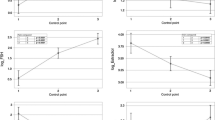Abstract
Eighteen previously untreated patients with metastatic carcinoma of the prostate were treated with LHRH analogue. They were divided into 3 groups according to the degree of glandular differentiation. In all groups, a transient rise of PAP and PSA was observed after the LH and testosterone surge. However, relative values of LH, testosterone, PAP and PSA did not differ significantly among the 3 groups. These facts suggest that a transient rise of PAP and PSA is caused by testosterone surge independently from the degree of glandular differentiation after LHRH analogue administration in patients with advanced prostatic cancer.
Similar content being viewed by others
References
Fraure, N., Labrie, F., Lemay, A., Belanger, A., Gourgeau, Y., Laroche, B., Robert, G.: Inhibition of serum androgen levels by chronic intranasal and subculaneous administration of a potent luteinizing hormone releasing hormone (LHRH) agonist in adult men.Fertil. Steril., 37, 416 (1982).
Smith, J. A. Jr.: Androgen suppression by a gonadotropin releasing hormone analogue in patient with metastatic carcinoma of the prostate.J. Urol., 131, 1110 (1984).
Kaisary, A. V., Tyrell, C. J., Peeling, W. B., Griffiths, K.: Comparison of LHRH analogue (Zoladex) with orchiectomy in patients with metastatic prostatic carcinoma.Br. J. Urol., 67, 502 (1991).
Winfield, H., Trachtenberg, J.: A comparison of a powerful luteinizing hormone analogue agonist and estrogen in the treatment of advanced prostatic cancer.J. Urol., 131, 1107 (1984).
Schulze, H., Senge, T.: Influence of different types of antiandrogens on luteinizing hormone-releasing hormone analogue-induced testosterone surge in patients with metastatic carcinoma of the prostate.J. Urol., 144, 934 (1990).
Kuhn, J. M., Billerbaud, T., Navratil, H., Moulonguest, A., Fiet, J., Grise, P., Louis, J. F., Costa, P., Husson, J. M., Dahan, R., Bertagna, C., Edelstein, R.: Prevention of the transient adverse effects of a gonadotropin-releasing hormone analogue (buserelin) in metastatic prostate carcinoma by administration of an antiandrogen (nilutamide).N. Engl. J. Med., 321, 413 (1989).
Schroder, F. H.: What is new in endocrine therapy of prostate cancer?Prog. Clin. Biol. Res., 357, 45 (1990).
Soloway, M. S.: Newer methods of hormonal therapy for prostate cancer.Urology, 24, 30 (1984).
Gleason, D. F.: Classification of prostatic carcinoma.Cancer Chemother. Rep., 50, 125 (1966).
Zungri, E., Salvador, J., Chechile, G., Diaz, I., Martinez, E.: Delayed hormonal therapy in advanced prostatic cancer.Prog. Clin. Biol. Res., 243B 441 (1987).
Stamey, T. A., McNeal, J. E.: Adenocarcinoma of the prostate, In: Walsh, P. C., Retik, A. B., Stamey, T. A., Vaughan, E. D. Jr. (eds): Campbell's Urology, 6th ed. Vol. 2. Chapt. 29. Saunders, Philadelphia 1992, 1159 pp.
Arai, Y., Yoshiki, T., Okada, K., Yoshida, O.: Multiple marker evaluation in prostatic cancer using prostatic specific antigen gamma-seminoprotein and prostatic acid phosphatase.Urol. Int., 44, 135 (1989).
Gleave, M. F., Hsieh, J. T., Wu, H. C., von Eschenbach, A. C., Chung, L. W. K.: Serum prostate specific antigen levels in mice bearing human prostate LNCaP tumors are determined by tumor volume and endocrine and growth factors.Cancer Res., 52, 1598 (1992).
Weber, J. P., Oesterling, J. E., Peters, C. A., Partin, A. W., Chan, D. W., Walsh, P. C.: The influence of reversible androgen deprivation on serum prostatic-specific antigen levels in men with benign prostatic hyperplasia.J. Urol., 141, 987 (1989).
Jackson, J. A., Waxman, J., Spiekerman, A. M.: Prostatic complications of testosterone replacement therapy.Arch. Intern. Med., 149, 2356 (1989).
Lin, M. F., Davolie, J., Garcia-Arenas, R.: Expression of uman prostatic acid phosphatase activity and the growth of prostatic carcinoma cells.Cancer Res., 52, 4600 (1992).
Author information
Authors and Affiliations
Rights and permissions
About this article
Cite this article
Sasagawa, I., Nakada, T., Kubota, Y. et al. Changes in serum levels of prostatic acid phosphatase and prostate specific antigen after luteinizing hormone-releasing hormone analogue administration in patients with metastatic prostatic cancer in relation to glandular differentiation. International Urology and Nephrology 27, 769–774 (1995). https://doi.org/10.1007/BF02552145
Accepted:
Issue Date:
DOI: https://doi.org/10.1007/BF02552145




